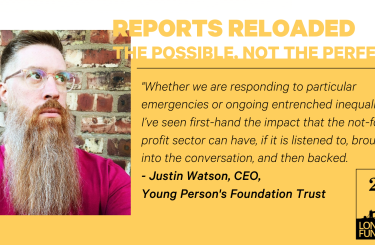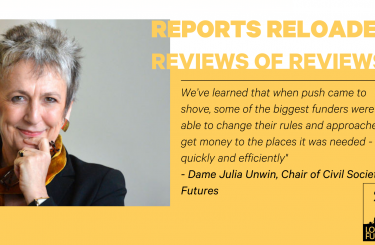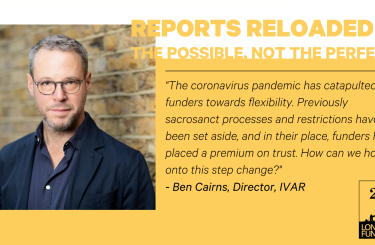Q: A central part of the Way Ahead vision and recommendations was to bring civil society into strategic planning and decision making about the future of London. Do you think that has happened following The Way Ahead report?
A: Partnership with civil society is one of the key mechanisms the GLA uses to bring about positive change in London, and we’re constantly exploring new ways to resource civil society as one of London’s largest funders. If you take that as a measure of how civil society’s role is understood and included in strategic planning, I think that is a positive sign.
The recommendations that are more difficult to implement and measure from the Way Ahead is how to meaningfully bring civil society into broader decision making – what does that look like practically?
With any one policy area, there will be specific stakeholders but when you have broader agendas, figuring out who the stakeholders from civil society are is less clear. While there has been some progress in this area, with the creation of organisations like London Plus and other infrastructure organisations, the task of ensuring such a large sector is meaningfully engaged remains complex. We’re doing a lot of work to develop better methodologies to bring civil society into wider decision making processes, including through projects such as Civic Futures, Connecting Communities and London Community Story.
Partnership with civil society is one of the key mechanisms the GLA uses to bring about positive change in London, and we’re constantly exploring new ways to resource civil society as one of London’s largest funders
Q: As a follow-up from that – another argument made in the Way Ahead was that civil society, in turn, needs to get better at communicating its value to strategic debates and better make the case for the value it brings to London. Do you think there is still a way to go in that respect?
A: Yes, but that requires civil society having the resource and capacity to do so. There have been efforts by civil society to create a more coherent narrative and a more united front and there are positive examples that have led to civil society having a stronger voice (the immigration advice sector for example).
Q: A key argument made in The Way Ahead report was that needs of London’s communities should shape civil society support (e.g. infrastructure support) but that the lack of data made it more difficult to identify what the actual needs were. Do you feel there’s been a shift towards recognising the importance of collecting and analysing data following The Way Ahead?
A: There have been lots of interesting and positive activities in how you build the capacity and data maturity of civil society. Organisations like Superhighways, DataKind, Coalition for Efficiency and 360Giving have all worked brilliantly with the sector, starting where people are at. There is still a long way to go, however. When needs far outstrip the demand of civil society, investing in core capacities like data collection and analysis becomes really challenging for organisations.
At the GLA, we have also spent a lot of time looking at civic data but that can feel very abstract and if you don’t have a framework, you don’t know where to start. Theoretically, people understand the value of having better data, but it has felt like too big a problem to solve. People won’t be motivated to increase their data collection unless they understand what it is going to be used for. Building a prototype for the Civic Strength Index - a tool that aims to measure what makes a strong community by pulling together data in a new way - creates a real focal point and people can actually see that their data can feed into this work and better help us measure the strength of London’s communities.
Theoretically, people understand the value of having better data, but it has felt like too big a problem to solve
Q: Since April 2016 a Systems Change Group has been tasked to facilitate change and scrutinise developments which have arisen from the recommendations of The Way Ahead report. Can you talk a bit about the experience of being part the Systems Change Group and where you see developments have been made to better meet the needs of civil society?
A: It was a group that had a huge amount of trust – although there were differences of opinions and approaches, the relationships were really strong which meant we could have robust challenge and responses while everyone was still being very committed to the central vision of the Way Ahead.
The Systems Change Group wasn’t just put together after the Way Ahead report was published, it had been challenging and scrutinising throughout the whole process and it stayed connected implementing the recommendations that came out of the report. That was a big lesson learned from my perspective – how much relationships are at the heart of systems change. They are the most important thing to invest in.
The impact of the Way Ahead report can really be measured by the investments in the relationships and the fact that most people involved in the process had been on a journey together.
Q: Finally, what have been some of the biggest lessons from The Way Ahead for the GLA civil society team?
A: Implementing the recommendations wasn’t just a side project at the GLA, it presented an opportunity to create a whole work programme in response to the issues raised in the Way Ahead report. The Civil Society Roots Programme for example, which focuses on equity infrastructure, emerged from the Way Ahead Project.
It also made us realise how different stakeholders fit together as part of an ecosystem, now we try to make sure that any project we deliver isn’t done in isolation and we consider how what we do fits into the wider ecosystem of London’s civil society.
The impact of the Way Ahead report can really be measured by the investments in the relationships and the fact that most people involved in the process had been on a journey together
One final reflection – there is so much going on in London, so much amazing activity and energy. Different parts of the city and different communities will be on their own journeys and developing in varied directions – that creates a huge amount of complexity but also a huge amount of resource and power. There will always be further to go, but that shouldn’t mean we can’t reflect on how far we’ve come.


